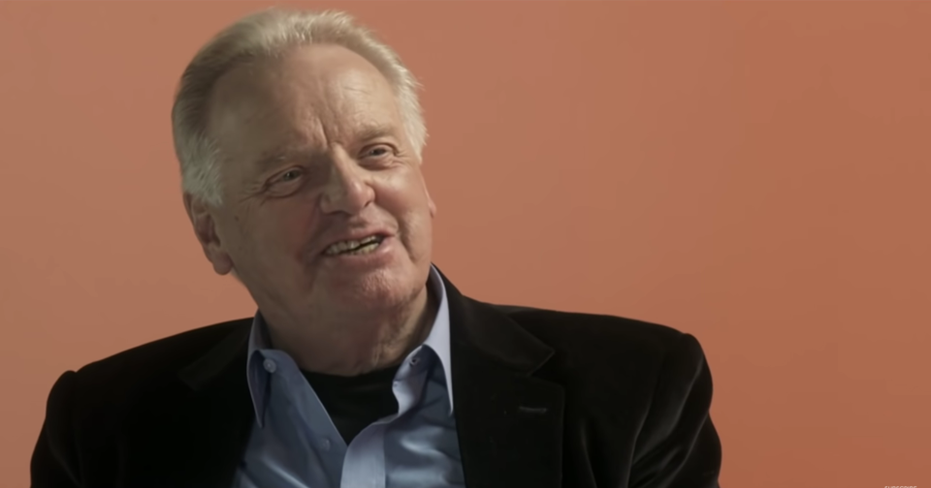The former Controller of BBC One Michael Grade has shed new details on his decision to axe Doctor Who in the 1980s.

Many a Doctor Who fan will be familiar with the work of Michael Grade. He became the Controller of BBC One in 1984 and was instrumental in trying to cancel Doctor Who during the Sixth Doctor’s first season.
And in a brand new interview in the Doctor Who Season 22 Blu-ray set, Michael Grade speaks candidly about this turbulent era in the show’s history. Over the years, there has been much rumour and speculation as to the real reasons behind Doctor Who‘s sudden disappearance from the airwaves in 1985. At the time, the official line was that the BBC wanted to rest the programme for 18 months so that it could be re-worked, with Michael Grade being particularly concerned that the programme had become too violent for a teatime slot.
And speaking in the new interview, Michael Grade concurs with this statement. As BBC One controller, he says that he made a point of watching all of his channel’s output and was concerned about the level of violence that was creeping into the programme. And it’s certainly true that some of the Fifth Doctor’s stories had some of the highest body counts in the history of Who (1984’s ‘Resurrection of the Daleks’ was particularly death-filled.) Other adventures like ‘Earthshock’ were equally action-packed, but it’s debatable as to whether the violence level was any higher than it had been in previous eras of the programme.
That being said, Doctor Who Season 22 did deal with some particularly adult themes, with two of its stories revolving around cannibalism. Plus there were other moments in the Sixth Doctor’s era that generated controversy, such as when an erratic Doctor tried to strangle Peri in ‘The Twin Dilemma‘ and when he killed the villainous Shockeye in ‘The Two Doctors’ with a cyanide-infused rag.
And whilst Michael Grade doesn’t cite these particular stories in the Blu-ray interview, it’s clear that he was unhappy with the level of violence that was present in what was essentially a family show, and he claims that its inclusion was “desperation” on the part of the production team who were trying anything they could to keep a dying show alive.
Moreover, Michael Grade speaks about his distaste for Doctor Who‘s production values. Apparently, he met with the producer John Nathan-Turner prior to the show’s “axing” and asked if he’d ever watched the likes of E.T. and Close Encounters of the Third Kind (big budget SF movies of the 70s and 80s) to which Nathan-Turner replied that he had. Grade then apparently told him that Doctor Who‘s audience had too, and that the programme looked dated in their eyes.
Ultimately, Michael Grade’s resolve was clear: he didn’t think Doctor Who provided good value for the licence fee payers’ money, and he thought it should be spent elsewhere. He acknowledges that the programme may have made more money in outside revenue than it cost to make (a claim that was made at the time in response to the show’s axing) although he wasn’t sure of the figures. In any case, he says, the BBC was a publicly-funded institution and it had to cater to the licence fee payers first and foremost, not to viewers in other countries.
What is less clear is why Michael Grade’s initial decision to axe Doctor Who morphed into an 18 month hiatus, and why Doctor Who continued to run for some four years after he tried to pull the plug. In the interview, Grade initially believes that Doctor Who ended after Season 23’s ‘The Trial of a Time Lord’ and is surprised to learn that it continued after this point. He suggests that the money to produce those seasons may have already been committed, and he was trying to avoid being wasteful.
One thing that Michael Grade is clear about is the decision to move Doctor Who opposite the popular ITV soap Coronation Street during the Sylvester McCoy era. He admits that this slot was reserved for programmes that were gentler in tone, or less appealing (like glass-blowing documentaries) and it certainly wasn’t a place he wanted to put “good” content. In the interview, he says that showing Doctor Who opposite Coronation Street was better than showing a blank screen – although he’d rather have shown a blank screen!
Michael Grade also dismissed the rumours that his motive to axe Doctor Who was a personal attack on its lead actor Colin Baker, insisting that his decision was solely based on the fact that he felt the show had run its course and was looking dated. And whilst he admits that science fiction generally isn’t to his taste, he acknowledges how impressed he was with the show when it returned in 2005, crediting its success to the genius of Russell T Davies.
But his claims that the show was unpopular with the licence fee payers is debatable; Seasons 21 and 22 consistently saw viewing figures around the 7 million mark. And the debate around the level of violence in Doctor Who is one that can be discussed endlessly, and indeed has been since its earliest days. For instance, ‘The Dalek Invasion of Earth’ in 1964 drew some of the show’s earliest complaints, which began with a roboman taking his own life by walking into the Thames.
And whilst the reaction to Michael Grade’s decision in 1985 was vocal, to say the least, he reveals that it didn’t really surprise him; he believes it was the result of “a cult” of people making a lot of noise, and newspapers churning out “good copy.”
The full interview with Michael Grade is available in the Doctor Who Season 22 Blu-ray box set.

Seventh Doctor scarf – order now from the Lovarzi shop!








Leave a Reply